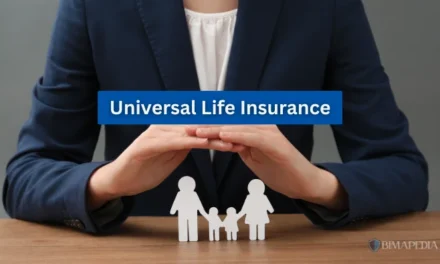Universal Life Insurance Explained: Key Benefits and Drawbacks

Universal life insurance (UL) is a flexible, permanent life insurance policy that not only provides a death benefit but also allows for the accumulation of cash value. This type of insurance is designed to provide lifelong coverage with the potential to grow the policy’s value over time.
It is often sought by individuals who want flexibility in premium payments and death benefits and a policy that can accumulate cash value.
In this article, we will explore the pros and cons of universal life insurance and answer some frequently asked questions to help you determine if it’s the right option for you.
What is Universal Life Insurance?
Universal life insurance is a type of permanent life insurance that offers both a death benefit and a savings or investment component. You can adjust the premium payments and death benefits over time within certain limits set by the insurer. This flexibility makes UL different from other forms of life insurance, such as term life insurance, which provides coverage for a fixed time.
The cash value of the policy grows based on interest rates set by the insurance company, and policyholders can use this cash value to pay premiums, take loans, or withdraw funds, subject to certain conditions.
Key Features of Universal Life Insurance
- Flexibility in Premium Payment: Unlike traditional whole life insurance, universal life insurance allows the policyholder to adjust the amount and timing of premium payments.
- Cash Value Accumulation: The premiums paid into the policy build cash value, which grows over time. This growth is typically tax-deferred, meaning you won’t pay taxes on the accumulated cash value until it is accessed.
- Adjusted Death Benefits: Universal life insurance policies usually offer two types of death benefits: a level death benefit and an increasing death benefit. This enables policyholders to modify their coverage to accommodate evolving needs.
- Loan and Withdrawal Options: The policyholder can borrow against the cash value of the policy or make withdrawals, although loans and withdrawals may reduce the death benefit if not repaid.
Pros of Universal Life Insurance
Flexibility in Premiums
Flexibility is one of the main benefits of universal life insurance. Policyholders can adjust their premiums as needed, provided there is enough cash value in the policy to cover the cost of insurance.
This flexibility can be beneficial in situations where income fluctuates or financial circumstances change.
Lifelong Coverage
As a form of permanent insurance, universal life insurance guarantees that the policy will remain in force for the policyholder’s lifetime as long as premiums are paid.
Unlike term life insurance, which expires after a set period, UL provides coverage for life.
Cash Value Growth
Universal life policies accumulate cash value over time. This cash value grows tax-deferred, which means that policyholders do not pay taxes on the gains unless the funds are withdrawn.
This growth can be used for future premium payments, or loans can be taken against the accumulated value.
Adjusted Death Benefits
UL policies typically offer two death benefit options:
- Option A (level death benefit): The death benefit doesn’t change throughout the policy.
- Option B (increasing death benefit): The death benefit increases over time as the cash value of the policy grows. This option can provide more substantial coverage for beneficiaries, though it often comes with higher premiums.
- Loan and Withdrawal Options: The cash value that accumulates in a universal life policy can be borrowed against or withdrawn. Loans are typically offered at low interest rates and can be used for any purpose, including emergencies or other financial needs. However, loans that are not repaid will reduce the death benefit.
Cons of Universal Life Insurance
Complexity
Universal life insurance policies are often more complicated than term life policies due to their combination of death benefits, cash value, and flexible premiums.
The interest rates on the cash value change and fees can vary, making it challenging to fully understand how the policy works.
High Premiums
Generally speaking, universal life insurance is more costly than term life insurance, especially during the initial years of the policy. These higher premiums are needed to cover both the death benefit and the accumulation of cash value.
The cost of insurance increases as the policyholder ages, which can lead to higher premiums later in life.
Interest Rate Risk
The insurer’s interest rates determine how much the policy’s cash value increases. If rates drop, the cash value may grow more slowly than expected, and the policyholder may need to adjust premiums to keep the policy in force.
This uncertainty can lead to unpredictability in the cash value accumulation.
Potential for Policy Lapse
If the cash value of the policy is insufficient to cover the cost of insurance or premiums, the policy may lapse. This is especially a risk during the early years of the policy when cash value has not yet accumulated.
It’s crucial to monitor the policy to ensure sufficient funds are available to maintain coverage.
Investment Risk
Some universal life policies, especially variable universal life insurance, allow policyholders to invest the cash value in various investment options.
This carries greater risks in addition to the possibility of larger gains. The investments’ cash worth may drop if they don’t perform well.
Slow Cash Value Growth in Early Years
In the early years of the policy, the cash value often grows slowly, as a significant portion of your premium is applied to insurance costs, administrative fees, and commissions.
It may take a number of years for the cash value to rise considerably.
When to Consider Universal Life Insurance
Universal life insurance might be a good option for people who:
- Want flexible premium payments and coverage amounts?
- Are you looking for permanent coverage with the potential for cash value accumulation?
- Are comfortable with managing an insurance policy and understand the potential risks involved.
It is particularly suitable for those with long-term financial goals who are willing to engage with the policy regularly. If you are simply seeking low-cost life insurance for a fixed period, term life insurance might be a better choice.
Conclusion
Universal life insurance offers a flexible, long-term solution for life insurance needs, but it comes with complexities and costs that should not be overlooked. Carefully consider your financial goals, the flexibility you need, and your ability to manage the policy over time.
It may be a suitable option for those looking for permanent coverage with the potential for cash value growth, but it’s important to fully understand the terms and risks involved.
Before purchasing universal life insurance, speak with a licensed financial advisor to ensure it aligns with your financial goals and risk tolerance.
FAQs
Here are some frequently asked questions to help further clarify how Universal Life Insurance works.
How Does the Cash Value of Universal Life Insurance Grow?
The cash value grows through interest, which is credited by the insurance company. The interest rate is usually variable, depending on market conditions, but there is often a guaranteed minimum rate
Can I Change My Death Benefit Amount?
Yes, you can change, increase, or decrease the death benefit, but increasing it may require proof of insurability. Changes in the death benefit will affect the premium payment.
How Much Does Universal Life Insurance Cost?
The cost varies depending on factors such as the death benefit, the age of the policyholder, health, and any riders added to the policy. Because of the cash value component, it is usually more costly than term life insurance.
Can I Borrow From My Policy’s Cash Value?
Yes, you can borrow from your policy’s cash value. However, the loan will accrue interest, and if not repaid, it will reduce the death benefit paid to your beneficiaries.
Is Universal Life Insurance Better Than Term Life Insurance?
Universal life insurance is more flexible and provides lifelong coverage, while term life insurance is generally cheaper and only covers you for a specific period. The choice depends on your financial goals, your need for flexibility, and how
Can I Cancel My Universal Life Insurance Policy?
Yes, you can cancel your life insurance policy at any time. However, if you cancel the policy within the first few years, you may not receive much of the cash value back due to early surrender charges.
Can Universal Life Insurance Be Used As An Investment?
While the cash value component can grow over time, it’s important to remember that the primary purpose of universal life insurance is to provide life insurance coverage. It’s not designed to be a high-performing investment compared to other options like stocks or bonds.







Recent Comments